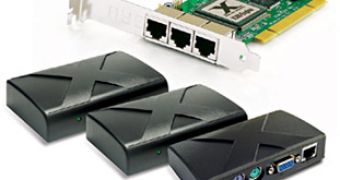Most computer systems that are found in offices and schools nowadays are equipped with processors capable of much more raw performance than their users will ever need on a regular basis, so a company from Redmond came up with a way to make one fully fledged desktop PC run up to seven workstations (dumb terminals or thin clients as they are sometimes called in this context). All of the seven terminals come with their own mouse, keyboard and monitor and all the computing is done on a single processor, housed inside the desktop PC that acts as server.
According to the news site SFGate.com, the processor sharing technology comes in the shape of an add-on card named Xtenda, that is being produced and sold by the nComputing company. Using the Xtenda card a single common desktop computer is turned into something like a mainframe, letting up to seven users share among them the server's hardware resources.
The chief executive of the nComputing company, Stephen Dukker, said that the concept is not a new invention, it dates back to the years of the large scale mainframes (the 1960s and '70s) and the time-share computing. Using one single powerful processor to drive many thin clients, that have very limited computing capabilities of their own represents the "time-share computing" essence in a nutshell. "Today's PCs essentially have the processing power of a mainframe, but most of the time that power is wasted," said Dukker, who co-founded the eMachines company, a 1990s firm that drove PC prices below $1,000.
The Xtenda card plugs into the "server" computer and a special software suite is loaded, while the card itself is connected to three black boxes that will receive a mouse, keyboard and monitor each. The cost of such a card, including the three attached black boxes, is $2100 and additional workstations can be purchased for $70 each. According to the nComputing company, two such cards can be easily served by a modern day PC, allowing up to seven users to connect to the system. The PC hardware sharing technology employed by the Xtenda cards is very similar to a modern day trend in several companies that are trying to cut costs by replacing the desktop computers with thin clients connected to a large and powerful server. The operating costs of the thin clients are very low compared to traditional computers according to Jeff McNaught, chief marketing officer for Wyse Technology, a San Jose firm that is a leader in thin-client hardware.

 14 DAY TRIAL //
14 DAY TRIAL //